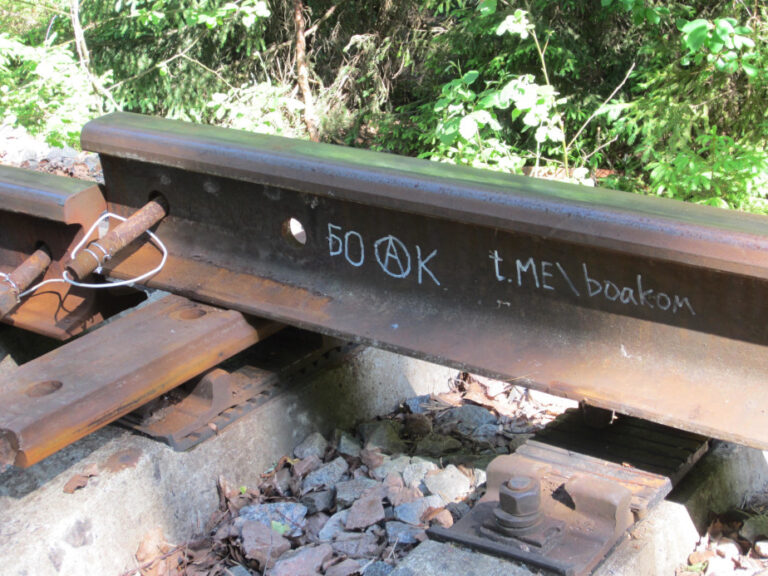BOAK: The anarchist partisans sabotaging Russian railways
We speak to the armed Russian group staging attacks on Russia's military infrastructure - inside the country's borders.
We speak to the armed Russian group staging attacks on Russia's military infrastructure - inside the country's borders.
On 17 April 2022, a cellular communications tower went up in flames in a village just outside Belogorod, the nearest Russian city to the border with Ukraine. This might seem a small enough event against the backdrop of a war that has claimed tens of thousands of lives and destroyed untold billions of dollars’ worth of infrastructure, but as attacks go, this was an unusual one. It was staged not by the Ukrainian military, but by a militant group of anarchists - specifically, BOAK, the Combat Organization of Anarcho-Communists.
The cross-border Russian-Belarusian group has been operating since 2018 and says it is run via a collective leadership. On their site and in communiques, they preach the ideals of radicalism, socialism, and the more immediate aim of toppling President Vladimir Putin’s regime, which they describe as fascistic. Originally set up as an underground organisation best known for a popular Telegram channel - now amounting to some 7,5000 readers - and a website, the Russian invasion of Ukraine spurred the group into overt partisan activity.
The attack on the cell tower was the first, but not by any measure the last. In the years since, BOAK sabotaged railway lines, disrupted military installations and began to increase the frequency of their actions. Their site claims six major attacks, ranging from damaging rails, to torching the cars of local Putin supporters, to their most major operation to date - blowing up a bridge on the Trans-Siberian Railway late last year.
The Lead spoke to a representative of the group in late May.
How did BOAK react as Russia invaded Ukraine? What were your first thoughts, your first aims, once news of the invasion broke?
We discussed the possibility of a war before Putin's invasion, at the beginning of February. Actually, at that moment, even we underestimated this possibility - we thought that it would be suicidal for Putin’s regime. Obviously, we didn't realise how far they are from reality.
But, we made the decision, that if the war did start, it will mean that our time for preparation is finished and we need to begin to act, use all we have and consolidate partisan forces around our organisation.
Our first thought, when we woke up at 6am from messages from friends was “Pizdec”: "Fucking shit".
And then?
We started to act.
Different parts of our organisation had different aims and tasks. Comrades in Ukraine, like Dmitry Petrov, who was killed in Bakhmut on April 19th this year, went to the antiauthoritarian defence forces right away - to oppose Putin's invasion with weapons in their hands.

People in the Russian part of the organisation needed to analyse the situation first. Discover the weaknesses of the army, where we need to strike - to make sure our struggle did not end with the first attack.
We decided to start with military objects and objects which were needed for the invasion, like the cell tower in Belgorod. We then worked on the research and scouting of objects for attack, before preparing and performing such attacks.
We, as revolutionaries, know that our duty is the revolutionary struggle, regardless of circumstances. Our goal is the social revolution, the destruction of the state and capitalism
What was the inspiration for your movement as a whole and for your tactics now?
We are inspired by the revolutionary movements of the past and the present. For example, the anarchist group Black Banner, which operated in the territory of the Russian Empire at the beginning of the last century.
Alongside this, we also look to Underground Anarchists that acted against both the Whites and the Bolsheviks during the Russian Civil War.
Of course, among our historical inspirations were also the Revolutionary Insurgent Army of Ukraine of Nestor Makhno and the Spanish anarchists of the last century, who, for decades, carried on their armed struggle both in the underground and in the open.
Among our modern inspirations are the Kurdistan Workers' Party. We are inspired by the Kurdish revolutionaries, because they fought for decades and did not give up, despite all their sacrifices and hardships. We also watch with interest the revolutionary social experiment in Rojava. It is very interesting for us interesting because it shows that a disciplined revolutionary organisation can control territory without concentrating power in its hands, but instead, by transferring it to institutions of direct democracy.
As for the examples of personalities that inspire us, we want to first mention our own comrade, Dmitry Petrov. A member and one of the creators of our organisation, he was, as previously mentioned, killed in battle near Bakhmut, fighting against Putin's invaders. Everyone should strive to be like him, to be purposeful, principled and modest.

Where did the idea for rail sabotage come from?
It was one of the options, along with targeting military radio towers and other infrastructure. We don't remember exactly where it came from, but, some part of this decision was from the experience of Belarusian partisans in 2020. They sabotaged Belarusian railways to damage Lukashenko's regime economically.
We like this type of attack because it's rather simple to perform. This is important for us, because we want not only to act ourselves, but to demonstrate to other people, not ones with prior experience, that they also can take part in the struggle. Thus, using some simple methods and demonstrating that they give big results, is very important for this.
We wanted to make these actions more attractive for people and make them simpler to understand. This is why we didn’t attack civilian rail lines by slowing down trains through braking signalling equipment and creating economic damage. Instead, we targeted military railways, ones that lead to military facilities and warehouses.
How alarmed do you think the Russian authorities are by your group and similar organisations?
We cannot know for sure what the Russian authorities think. However, we are sure that our activities inconvenience them.
It is not only about the practical meaning of arson attacks and acts of sabotage, although this should not be underestimated. A significant part of Russian society is critical to the Russian state policy. The fact that there are revolutionary groups out there that use partisan methods of struggle, can inspire these people. This presence stops them from losing hope for change.
We also make it clear that sabotage and other forms of partisan resistance can and should be used. In addition, we introduce an Anarchist agenda to the Russian opposition environment. By word and deed, we show that the best way to put an end to wars between people is to destroy the state and capitalism.
How do you think Putin's rule ends in Russia?
The future is not predetermined. Maybe the Putinist military machine will be defeated in Ukraine and as a result, we will see the destabilisation of the situation in Russia, the emergence of a revolutionary situation. But, other scenarios are also possible.
We, as revolutionaries, know that our duty is the revolutionary struggle, regardless of circumstances. Our goal is the social revolution, the destruction of the state and capitalism.
We will go to this goal, with the memory of Dmitry Petrov and other martyred comrades in our hearts.
We want to bring campaigning back into journalism. Lend us a hand, and get our weekly newsletter and magazine editions in your inbox, for free.